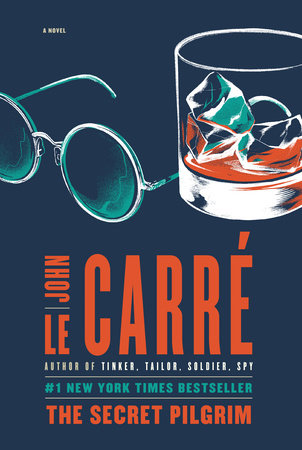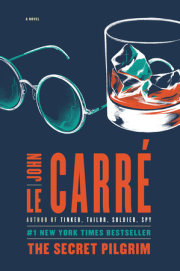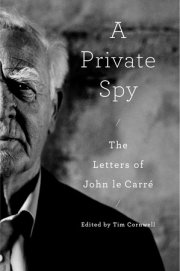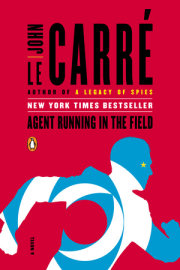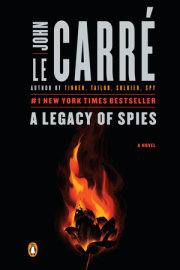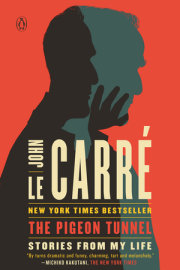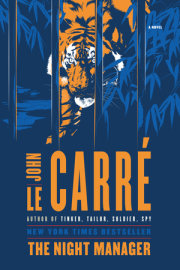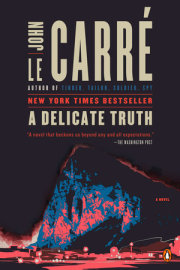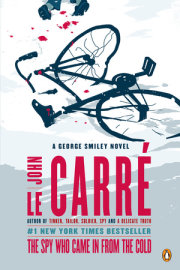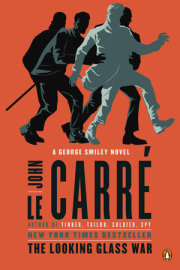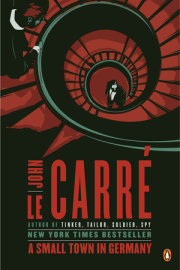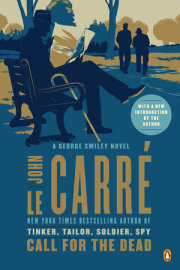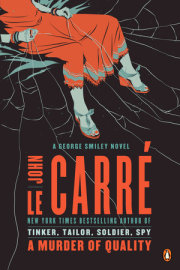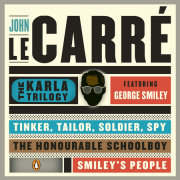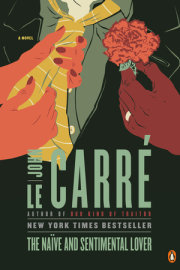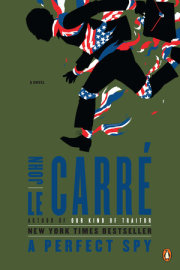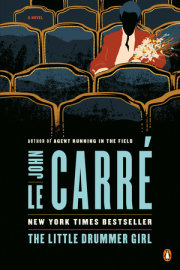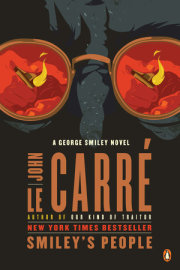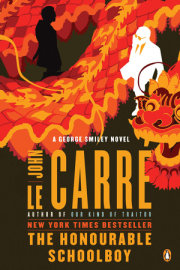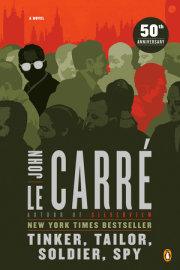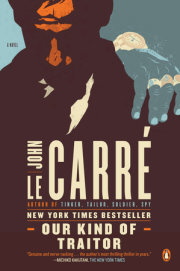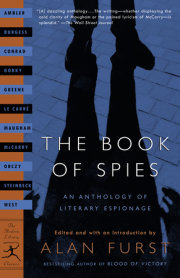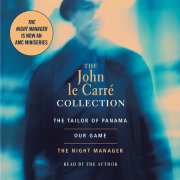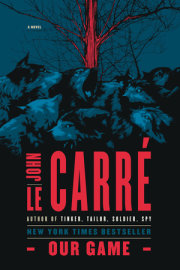Let me confess to you at once that if I had not, on the spur of the moment, picked up my pen and scribbled a note to George Smiley inviting him to address my passing-out class on the closing evening of their entry course—and had Smiley not, against all my expectations, consented—I would not be making so free to you with my heart.
At the most, I would be offering you the sort of laundered reminiscence with which, if I am honest, I was a bit too inclined to regale my students: feats of secret chivalry, of the dramatic, the resourceful and the brave. And always, of course, the useful. I would be enthralling you with memories of night drops into the Caucasus, hazardous crossings by fast boat, beach landings, winking shore lights, clandestine radio messages that ceased in midtransmission. Of silent heroes of the Cold War who, having made their contribution, modestly went to earth in the society they had protected. Of defectors-in-place snatched in the nick of time from the jaws of the opposition.
And to a point, yes, that is the life we lived. In our day we did those things, and some even ended well. We had good men in bad countries who risked their lives for us. And usually they were believed, and sometimes their intelligence was wisely used. I hope so, for the greatest spy on earth is worth nothing when it isn’t.
And for the lighter note, over a second whisky in the Probationers’ Mess, I would have picked out for them the occasion when a three-man reception team from the Circus, operating inside East Germany, and gallantly led by myself, lay freezing on a ridge in the Harz Mountains, praying for the flutter of an unmarked plane with its engines cut, and the blessed black parachute floating in its wake. And what did we find when our prayer was answered and we had slithered down an icefield to claim our treasure? Stones, I would tell my wide-eyed students. Chunks of honest Argyll granite. The despatchers at our Scottish airbase had sent us the training cannister by mistake.
That tale, at least, found a certain echo, even if some of my other offerings tended to lose their audience halfway through.
I suspect that my impulse to write to Smiley had been brewing in me longer than I realised. The idea was conceived during one of my regular visits to Personnel to discuss the progress of my students. Dropping in on the Senior Officers’ Bar for a sandwich and a beer, I had bumped into Peter Guillam. Peter had played Watson to George’s Sherlock Holmes in the long search for the Circus traitor, who turned out to be our Head of Operations, Bill Haydon. Peter had not heard from George for—oh, a year now, more. George had bought this cottage in North Cornwall somewhere, he said, and was indulging his dislike of the telephone. He had some kind of sinecure at Exeter University, and was allowed to use their library. Sadly I pictured the rest: George the lonely hermit on an empty landscape, taking his solitary walks and thinking his thoughts. George slipping up to Exeter for a little human warmth in his old age while he waited to take his place in the spies’ Valhalla.
And Ann, his wife? I asked Peter, lowering my voice as one does when Ann’s name comes up—for it was an open secret, and a painful one, that Bill Haydon had counted among Ann’s many lovers.
Ann was Ann, said Peter, with a Gallic shrug. She had bits of family with grand houses on the Helford Estuary. Sometimes she stayed with them, sometimes she stayed with George.
I asked for Smiley’s address. “Don’t tell him I gave it you,” said Peter as I wrote it down. With George, there had always been that certain kind of guilt about passing on his whereabouts—I still don’t quite know why.
Three weeks later Toby Esterhase came down to Sarratt to give us his celebrated talk on the arts of clandestine surveillance on unfriendly soil. And of course he stayed for lunch, which was greatly enhanced for him by the presence of our first three girls. After a battle lasting as long as I had been at Sarratt, Personnel had finally decided that girls were all right after all.
And I heard myself trailing Smiley’s name.
There have been times when I would not have entertained Toby in the woodshed, and others when I thanked my Maker I had him on my side. But with the years, I am pleased to notice, one settles to people.
“Oh look here, my God, Ned!” Toby cried in his incurably Hungarian English, smoothing back his carefully pomaded mane of silver hair. “You mean you haven’t heard?”
“Heard what?” I asked patiently.
“My dear fellow, George is chairing the Fishing Rights Committee. Don’t they tell you anything down here in the sticks? I think I better take this up with the Chief actually, one to one. A word in his ear at the Club.”
“Perhaps you’d tell me first what the Fishing Rights Committee is,” I suggested.
“Ned, you know what? I think I get nervous. Maybe they took you off the list.”
“Maybe they did at that,” I said.
He told me anyway, as I knew he would, and I duly acted astonished, which gave him an even greater sense of his importance. And there is a part of me that remains astonished to this day. The Fishing Rights Committee, Toby explained for the benefit of the unblessed, was an informal working party made up of officers from Moscow Centre and the Circus. Its job, said Toby—who I really believe had lost any capacity to be surprised—was to identify intelligence targets of interest to both services and thrash out a system of sharing. “The idea actually, Ned, was to target the world’s trouble spots,” he said with an air of maddening superiority.—“I think they fix first the Middle East. Don’t quote me, Ned, okay?”
“And you’re telling me Smiley chairs this committee?” I asked incredulously when I had attempted to digest this.
“Well, maybe not much longer, Ned—Anno Domini and so forth. But the Russians were so frightfully keen to meet him, we brought him in to snip the tape. Give the old fellow a treat, I say. Stroke him a bit. Bunch of fixers in an envelope.”
I didn’t know which to marvel at the more: the notion of Toby Esterhase tripping to the altar with Moscow Centre, or of George Smiley presiding over the marriage. A few days later, with Personnel’s permission, I wrote to the Cornish address Guillam had given me, adding diffidently that if George loathed public speaking half as much as I did, he should on no account accept. I had been a bit in the dumps till then, but when his prim little card arrived by return declaring him delighted, I felt a probationer myself, and just as nervous.
Two weeks after that, wearing a brand-new country suit for the occasion, I was standing at the barrier at Paddington Station, watching the elderly trains disgorge their middle-aged commuters. I don’t think I had ever been quite so aware of Smiley’s anonymity. Wherever I looked, I seemed to see versions of him: tubby, bespectacled gentlemen of a certain seniority, and every one of them with George’s air of being slightly late for something he would rather not be doing. Then suddenly we had shaken hands and he was sitting beside me in the back of a Head Office Rover, stockier than I remembered him, and white-haired, it was true, but of a vigour and good humour I had not seen in him since his wife had her fatal fling with Haydon.
“Well, well, Ned. How do you like being a schoolmaster?”
How do you like retirement?” I countered, with a laugh. “I’ll be joining you soon!”
Oh, he loved retirement, he assured me. Couldn’t get enough of it, he said wryly; I should have no fears of it at all. A little tutoring here, Ned, the odd paper to deliver there; walks, he’d even acquired a dog.
“I hear they hauled you back to sit on some extraordinary committee,” I said. “Conspiring with the Bear, they say, against the Thief of Baghdad.”
George does not gossip, but I saw his smile broaden. “Do they now? And your source would be Toby, no doubt,” he said, and beamed contentedly upon the dismal subtopian landscape while he launched into a diversionary story about two old ladies in his village who hated each other. One owned an antique shop, the other was very rich. But as the Rover continued its progress through once-rural Hertfordshire, I found myself thinking less about the ladies of George’s village than about George himself. I was thinking that this was a Smiley reborn, who told stories about old ladies, sat on committees with Russian spies and gazed on the overt world with the relish of someone who has just come out of hospital.
That evening, squeezed into an elderly dinner jacket, the same man sat at my side at Sarratt high table, peering benignly round him at the polished plate candlesticks and old group photographs going back to God knows when. And at the fit, expectant faces of his young audience as they waited on the master’s word.
“Ladies and gentlemen, Mr. George Smiley,” I announced severely as I rose to introduce him. “A legend of the Service. Thank you.”
“Oh, I don’t think I’m a legend at all,” Smiley protested as he clambered to his feet. “I think I’m just a rather fat old man wedged between the pudding and the port.”
Copyright © 2017 by John le Carré. All rights reserved. No part of this excerpt may be reproduced or reprinted without permission in writing from the publisher.

